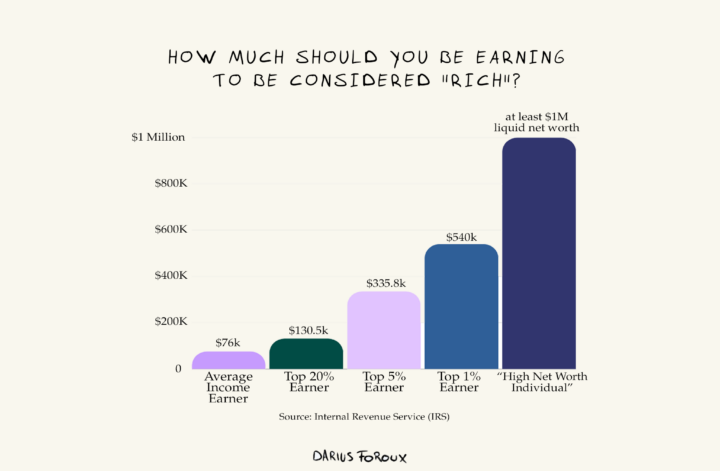What does it take to be considered “rich,” and how much should you earn to be “wealthy”?
Does the number really matter? These are questions that often come to mind when discussing personal finance.
The truth is, that being rich and being wealthy are two different things. You can be rich without being wealthy, and vice versa.
Being rich usually refers to having a larger income or owning highly valuable assets. When you’re rich, you can afford a luxurious lifestyle.
Being wealthy goes beyond just having a high income. Wealth is a broader definition that includes not only financial resources but also intangible assets such as time, knowledge, and relationships.
Being wealthy means being abundant in the above-mentioned resources that you get to live a secure, sustainable, and free life.
“How much money does it take to be considered rich?”
This is where the “number question” comes in: How much should you be earning to be considered rich?
- The Internal Revenue Service (IRS) says that you need an annual income of at least $540,009 to be among the top 1% of earners in the United States.1Source: IRS.gov
- To qualify for the top 5%, you’ll need to earn a minimum of $335,891 per year.2Source: Smart Asset
- The top 20% of earners need at least $130,545 per year if they live in the 100 largest U.S. cities.
But here’s the interesting thing: A recent interview from the Wall Street Journal found that many Americans who earn more or less $400,000 a year – even those who are living in single households (so they don’t have a family or kids to feed) – still don’t think of themselves as “rich” despite their income.3Source: Wall Street Journal
That’s understandable.
Most likely, these $400K folks have a very different lifestyle compared to those earning an average annual income of a little over $76,000.4Source: World Data So even if they’re earning more than four times the average income, they still don’t feel rich.
Factors that determine whether you’re rich or wealthy
The IRS may consider you a “rich” individual if you’re earning more or less $400,000.
But just because someone earns a lot doesn’t mean they’re wealthy. If they spend a lot or have a lot of debt, they might seem wealthy but actually have little to their name. That’s one factor that affects whether a person is rich or wealthy.
Meanwhile, wealth is often measured by net worth, which is the difference between what you own (assets) and what you owe (liabilities).
- Generally, if you have a liquid net worth of $1 million, you’re considered a high net worth (HNW) individual.5Source: Schwab
- To be classified as very high net worth, you’d need between $5 million and $10 million. And if you have $30 million or more, you’re in the ultra-high net worth category.
These figures show how the financial industry views wealth.
But what about normal people? The average American believes that a net worth of $774,000 is enough for financial comfort, while $2.2 million is seen as wealthy.
I usually avoid relying on dictionary definitions, but in this case, I believe using it is the best way to accurately describe true wealth. One dictionary definition of wealth is:
“A plentiful supply of a particular desirable thing.”
That’s what the most profitable companies in the world do: They provide something that a lot of people are willing to pay good money for.
It’s best to look at the following factors to benchmark your finances. For each item, I also added a question you can use to guide yourself closer to financial independence and wealth.
Income sources of the rich vs wealthy
Do you have multiple income sources that can continue earning if one income source suddenly dries out? Is a single one of these income sources enough for you to live on?
For example, imagine being a restaurant business owner during the early days of the pandemic. A lot of restaurant businesses closed at the time because people couldn’t go out to eat for months. To avoid that, you’ll need a diversified portfolio of businesses you can rely on when another shuts down.
Real wealth is about lasting value and diversification. It doesn’t matter if your wealth is inherited or earned on your own; the key is to have investments and assets that generate income regardless of the economy, and for many years, across generations.
Assets
Do most of the things/assets you own appreciate in value over time?
If you’re rich, you might spend money on things like fancy cars or designer clothes. These items are expensive, but they don’t bring in money and might even lose value as time goes by.
Wealthy people, on the other hand, think about the future. They base their financial choices on their values and long-term goals. They understand the importance of aligning their decisions with their values to avoid negative consequences in the future.
Debt
Debt-to-Income (DTI) ratio stands for your monthly debt payments divided by your gross monthly income. It’s a method lenders often use to see how well you can handle monthly payments when you borrow money.
For example, if you have a total of $1,920 in monthly debt payments and earn $6,400 per month (for an annual salary of $76,800), your DTI ratio would be 30%. Your DTI ratio should ideally be below 36%, but many lenders prefer it to be even lower at around 28%.

Even if you’re in the top 1% of earners, you won’t build wealth if you have too much debt.
For those not even close to the 1% income level, the idea of overspending at such a rate might seem strange, but it happens a lot. High earners often max out their budgets on big houses, fancy cars, and extravagant trips. They might even rely on loans or credit cards to cover these expenses, leading to significant debt.
Truly wealthy individuals focus on paying off debt to keep their finances secure. When they do take on debt, it’s with the aim of boosting their future income, such as investing in real estate or a business.
Sustainability
How can you keep earning well while also finding time and energy for yourself and your loved ones, without getting burnt out?
High income often comes with a high price on people’s personal lives. We often hear about or see rich people who are miserable because they barely have time for themselves and their family/friends.
It’s no wonder that many high earners spend too much. It’s a coping mechanism for the high demands of their career. Meanwhile, wealthy individuals use a system that allows them to build wealth while living well. This enables wealthy folks to create wealth that lasts for generations.
More money won’t make you wealthy
To me, a wealthy person’s most defining trait is their freedom. This is what separates them from the rich folks.
When you’re free to do the things you truly want and only dedicate resources to things you truly care about – that’s when you become wealthy. Wealth is both a number and a mindset.
If you’re happy making $200,000 a year (which is enough to live a good life), bumping that up to $500,000 might not make a big difference to your happiness.
Additionally, the price you have to pay in terms of time and energy to double your income might even deteriorate your happiness. So that’s the real trade-off.
If you’re already doing well, should you be willing to sacrifice everything to get richer? In my book, the answer is no.




